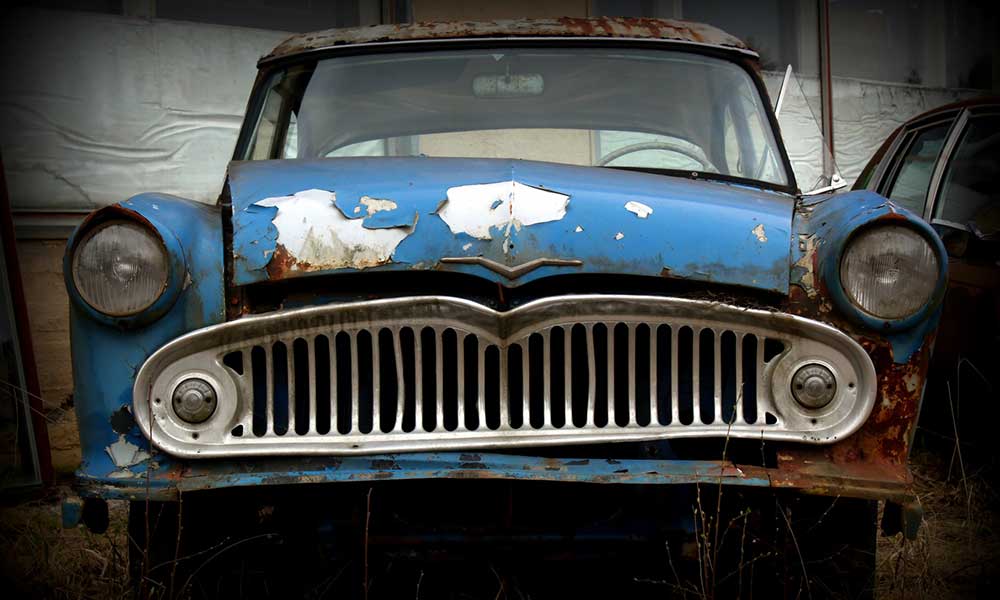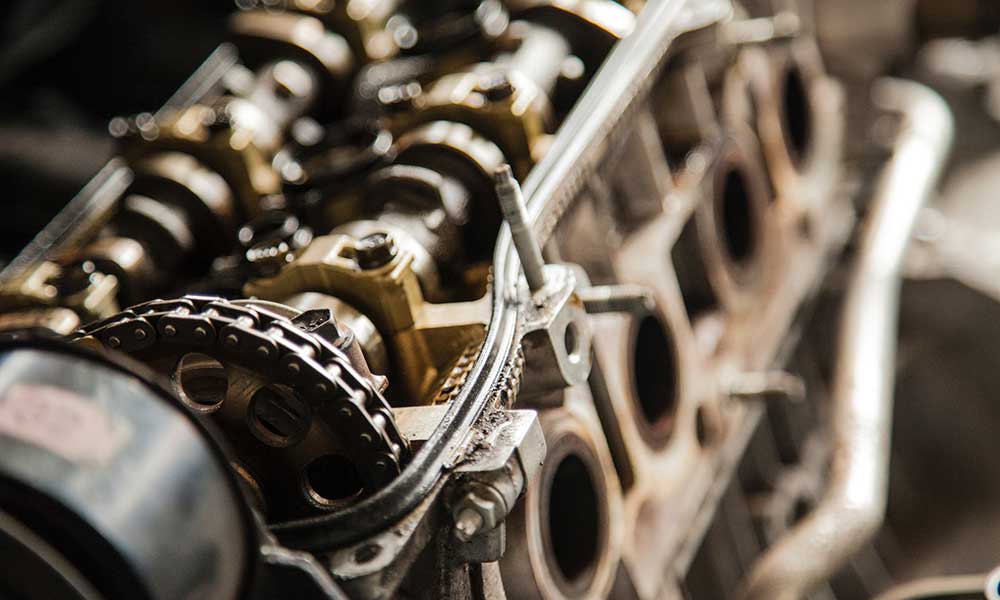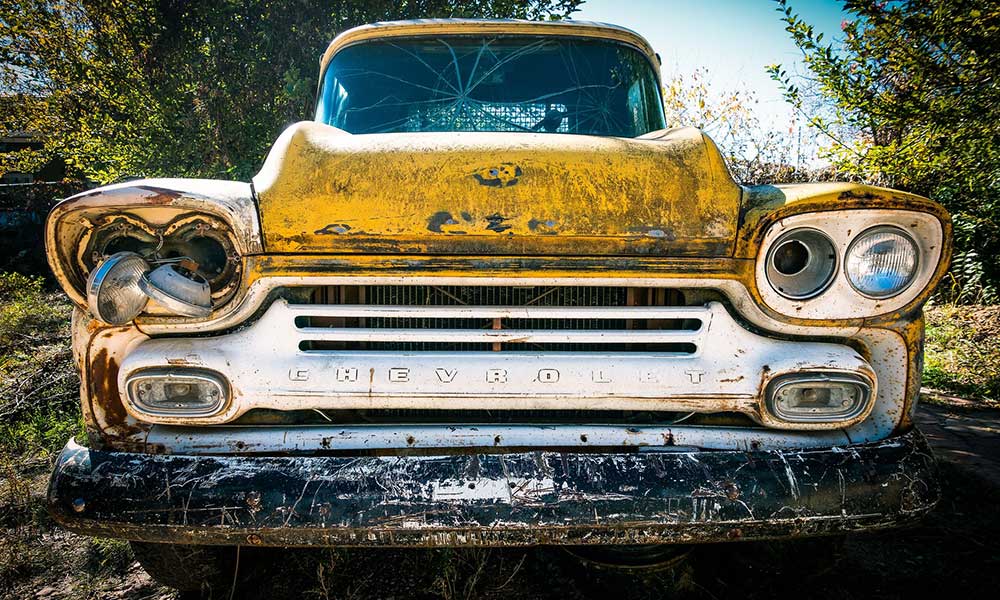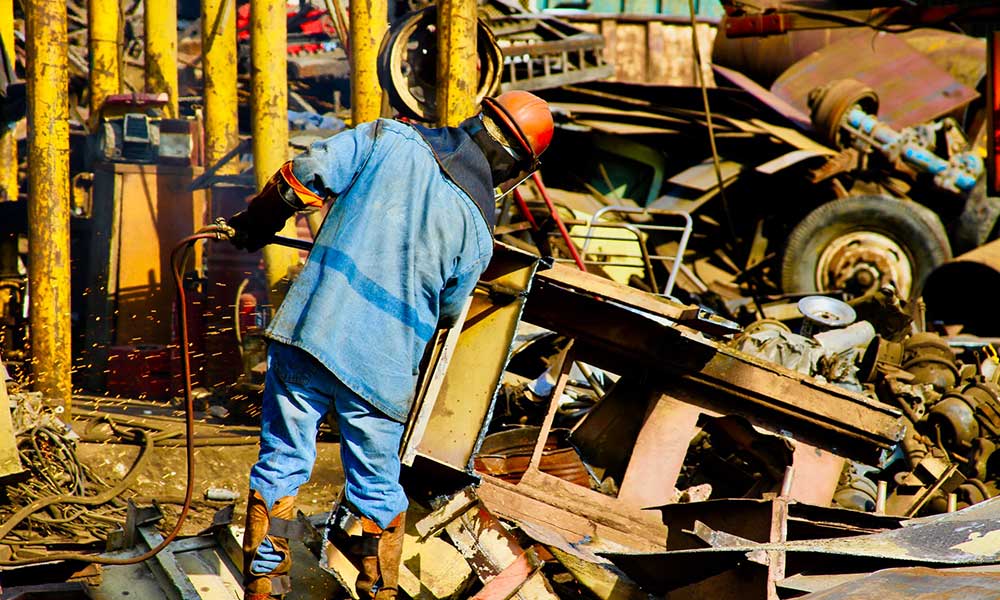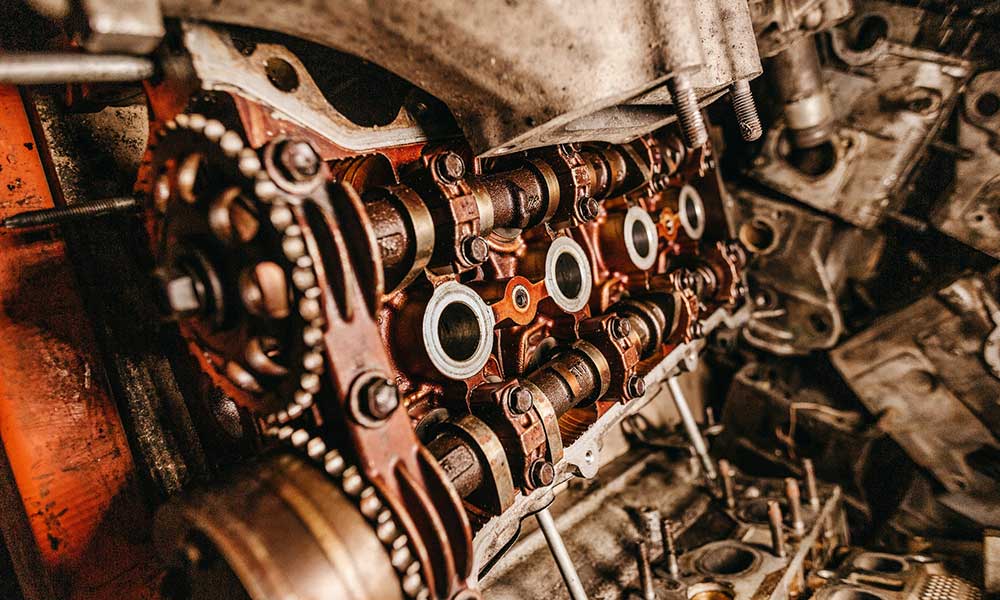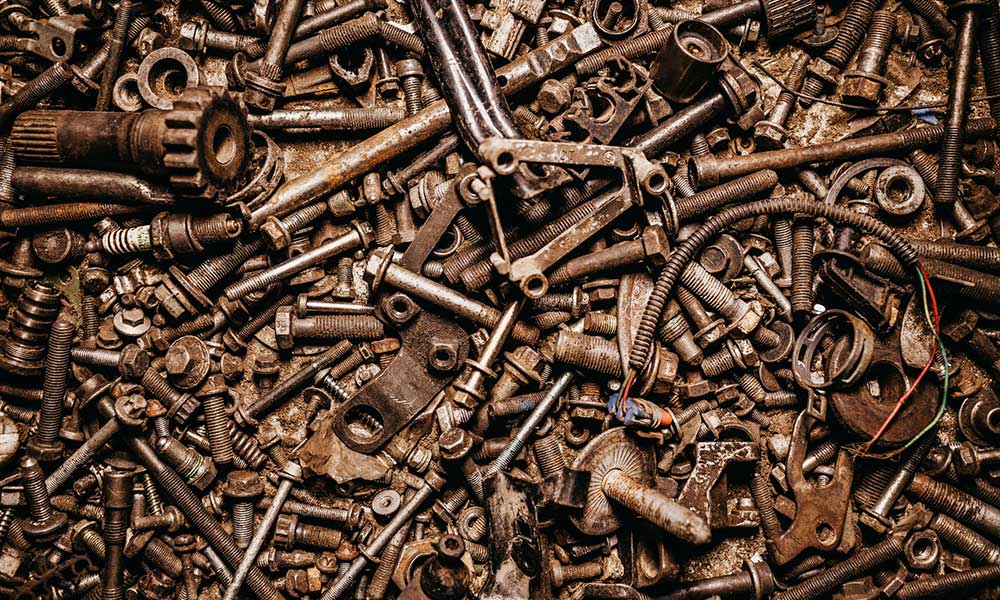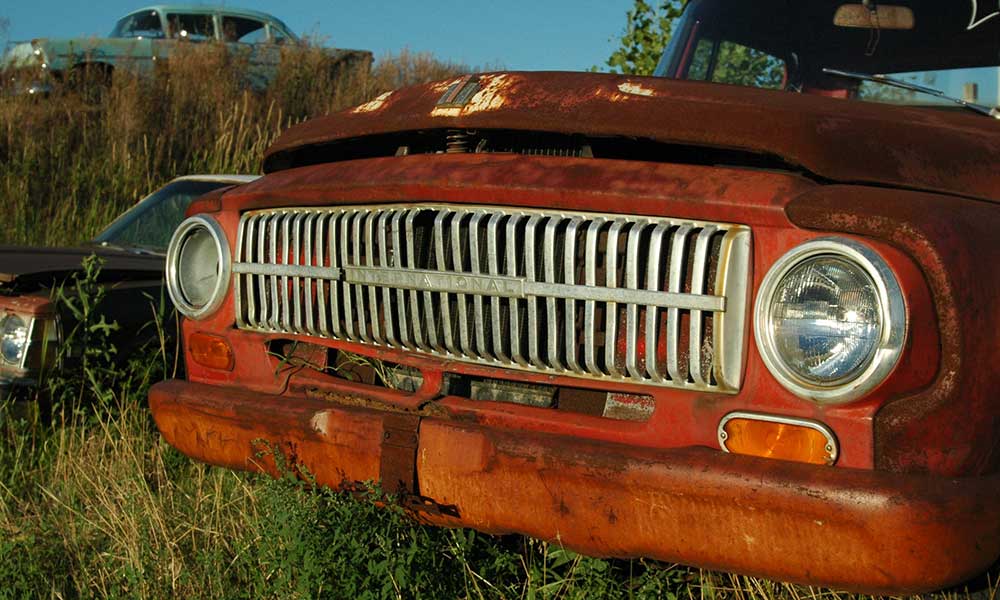When it comes to junking your car, it’s normal to have questions about different aspects of the junk car process. We’ve created a FAQ about common junk car questions. Check out the information regarding junk cars provided below.
Who Buys Junk Cars Without a Title?
Most just car companies will buy your junk car if you don’t have the car’s title. However, you must provide proof of ownership documentation. Proof of ownership documents can include the car’s registration card, and other documents, which may vary by state. You can also provide the car’s vehicle identification number (VIN). If you don’t have your car’s title, you may be able to request a duplicate car title by completing a specific form and submitting it to the DMV, or other facilities that handle driver services. You will also need your current driver’s license, state ID, or valid passport to help with proving you own the vehicle.
If you’re interested in selling your car to a junkyard without the car title, you need to make sure the car doesn’t have a lien on it. No exceptions will be made in this situation. If your car has an active lien on it, you will have to pay off the car first. You will need your driver’s license, passport, or state ID as a part of proving ownership of the vehicle. You’ll also need the car’s registration. Make sure you complete a dated bill of sale that includes the necessary information, including your current contact information and the signatures of the buyer and seller of the car.
Who Gives the Most Cash for Junk Cars?
Junk car or not, you want to make sure you’re getting the best price. Each junkyard is different, so the price they pay for your junk car will vary. The money you receive for your junk car depends on different factors, such as the amount of damage your car sustained, the make, model, and year of the car, and how many salvageable parts your car has.
Another factor you may want to consider is the towing fee. Not all junk car companies charge towing fees, but some do, so that’s something you should consider. Towing fees are something you need to think about when your junk car isn’t drivable. In this situation, you will need to have your car towed to the junkyard. Some junkyards offer this service for free and other junkyards don’t. However, if there is a towing fee, it will likely be deducted from your junk car quote upfront.
It’s also a good idea to look up the current scrap metal prices in your state to help you determine how much money you could receive for junking your car, and if the price provided for the car is fair. Take a few minutes to shop around by checking out at least 3 car junking companies and compare the quotes.
How Many Junk Cars Can You Have On Your Property?
If you’re like most people, you may not see any harm in having one or multiple junk cars on your property. After all, it is your property, so you can do what you want, right? Not quite. The law for junk cars in most states says you can only have 1 junk car on your property at a time.
Be advised that the law makes a clear distinction between junk cars and how they view them. Each state has its definition of a junk car. However, these definitions will be similar. A junk car can be defined as an automobile that is at least 5 years old, irreparable, immobile, or ONLY marketable as scrap. The law states that you can only have 1 junk car on your property and it must be stored inside, such as in a garage, shed, or similar housing, to prevent the car from being an eyesore to your neighbors.
Cars that have extensive damage are no longer worth spending money on for repairs and maintenance, which are then referred to as junkers. The basics of a junk car include:
- The cost to repair the car is higher than the car’s total value
- Cars that are parked on the street or property for an extended period
- Vehicles that are no longer road worthy
- Vehicles can’t be moved from one place to another
- No one wants to purchase the car in its current condition
- An insurance company won’t repair the car
- The car is empty of disassembled essentials (engine, transmission, and other essential car parts)
Should I Donate My Car or Junk It?
Junking your car is different from donating it. If your car can be driven and doesn’t have extensive damage, you might consider making repairs, then donating the car. If your car can’t be driven, has extensive damage, and the cost of repairs exceeds the car’s total value, it’s time to junk your car.
Ideally, cars that are perfect for donation are cars that are not used anymore but don’t have damages that prevent them from being operated safely on the road. In many states, donated cars are required to pass emissions checks and other vehicle checks to ensure the car is safe to drive. Cars that have high mileage might not be accepted as a donation because these cars tend to require expensive repairs.
On the other hand, if your car is collecting dust and has a lot of damage caused by an auto wreck, or other misfortune, you should consider junking the vehicle. Junking your car can put a little bit of cash in your pocket and you can get rid of the vehicle, and avoid possible penalties. After 150,000 miles, cars tend to require frequent repairs, which can be expensive. Junking a car generally signifies the death of a vehicle.
- Can I Junk a Car With a Lien On It?
Junking a car with a lien on it can be tricky. If you have a lien on your car, that means you don’t own the car, and you can’t junk a car that you don’t own. If you want to junk a car with a lien, you need to call the bank that approved your loan, tell them your situation, and maybe they will give you a discount because the car is no longer functional. The bottom line is, you must pay off the remaining balance of the junk car with a lien. Why? Once you pay the balance on the car, you become the owner, which means the car’s title will be transferred to you and you will receive the new title in the mail. With the car’s title, you have proof of ownership of the vehicle, which is required to junk a car. It may be a shot in the dark, but the lender may agree to lower the total cost of the car because it qualifies as a junk car.
It is important to have everything in writing. You need to have the necessary paperwork from the lender stating they are lowering the total cost of the car, if applicable, and state the reason(s) for doing so.
What Happens to Junk Cars?
You may be curious about what happens after you drop your car off at a junkyard or once the car is towed from its location to the junkyard. You might compare your car being junked to wood being put through a wood chipper, but that’s not quite how the junking process works.
During the first step of the car junking process, the car’s battery will be removed, and so will the tires and freon. Sometimes the car’s frame is done, but the parts aren’t. For example, if the car’s tires or battery still has some life in it, these parts will be resold.
In the next phase of car junking, the car’s fluids will be drained and the core parts will be removed. The car will be lifted to drain the remaining fluids. Multiple holes will be drilled to easily drain these fluids, such as brake fluid, oil, gas, and other fluids. Junkyards are all about reusing anything that can be salvaged, and this includes the vehicle’s fluids. If these liquids can be reused, they will be. All wires will be removed, and if they can be used, they will be salvaged.
Next, the final crush is performed. This is the junking step when the car is stripped of all its parts, including windows. The car is crushed into a rectangular shape and moved to the scrap metal facility.
Can I Junk a Car That’s Not in My Name?
Everyone wants to know if they can junk a car that’s not in their name. Here’s the issue with that, you can’t junk a car that you don’t legally own. So, if the car isn’t in your name, it’s not legally your car, and you don’t have the right to decide what happens to the car, such as choosing to junk it.
Since the car is not in your name, you’ll need to find the owner of the car to have the car put in your name. Different documents require signatures from the car’s owner and you to transfer the car’s title.
After locating the owner of the car, you’ll both need to take a trip to the driver’s license department in your state and provide a copy of the bill of sale. You will also need to provide additional information regarding the car, including an accurate odometer reading. You will be required to pay all the applicable fees to transfer the title of the car. You may also have to pay taxes on the vehicle. Make sure you have the required documentation ready with the proper signatures in the correct places on the car’s title to make the title transfer process as smooth as possible.
Can You Junk a Car With Expired Registration?
In most states, you can junk a car with an expired registration. However, you will still owe money if you didn’t revoke your car’s registration with the motor vehicle department. You will also need to surrender the license plate(s) to start canceling the car’s registration.
Although you can junk a car with an expired registration, you are still responsible for providing proof of ownership to the junkyard, which can be the car’s title. A bill of sale will not work as proof of ownership documentation in this situation.
A car’s registration is required for cars that are being driven on the roads and highways of a particular state. If your car has been out of commission for some time, and you’ve made up your mind to junk it, you are not required to register the car to junk it. So, you get a break there! However, since your car is not registered, it can’t legally be driven on the road or the highways in your state, so your car must be towed, even if it is operational enough to drive. There’s no need to get tickets and have fines to pay when it can be avoided.
Can You Junk a Car Without Keys?
It happens to the best of us. Whether your car is functional or not, it’s not difficult to misplace your keys. If you’ve had your car for a while, especially if the car isn’t running, you’re not worried about the keys.
Yes, you can junk your car without the keys. However, not having the keys can complicate the junking process a little. So, without the junk car’s keys, you will be required to provide additional documentation and accept the fact that you will probably receive less money when you junk your car.
Most junkyards will accept the fact that you lost the keys to the car, but they’ll need to see paperwork that proves you’re the legal owner of the car. Like the keys, since the car was sitting there not being used, you might not have been concerned with any of its paperwork, so there’s a chance you no longer have the necessary paperwork to junk your car.
If you no longer have the necessary paperwork to junk your car, don’t stress. A lot of junkyards will still junk your car, but they might use a deferred payment in case ownership issues of any type arise. You may also have to pay for an HPI check.
Can You Junk a Financed Car?
Car financing has different forms, such as a hire purchase agreement, a credit sale, or a traditional lease. Regardless of the type of car financing you have, you don’t own a car you are leasing until you make all the payments on the car. If you have not made all the payments on the car, the car is not yours to sell. However, there are some exceptions to this rule. If you get a bank loan to purchase a car, in this instance, the vehicle belongs to you, meaning you are the owner of the car. In this situation, you can sell your car at any time. Of course, you are still responsible for paying back the money you borrowed from the bank for the car. If you use an overdraft to purchase a car, you are the owner of the car in this situation, and can legally sell the car to a junkyard.
If you have an outstanding debt on the car, you must pay the debt you own to settle the account before you can become the owner of the car and legally junk the car. If you’re considering settling your debt early, there may be a fee to pay.
Can I Junk a Car With a Bill of Sale?
The short answer is yes in most states. Junking a car means you are selling an old salvaged car to a junkyard. In general, junkyards required the car’s title as proof of ownership documentation to prove you are the legal owner of the car. However, some junkyards will accept your car without the title, but you are still responsible for proving you are the legal owner. In this situation, you might be able to use your car’s registration, the bill of sale or an invoice, and your current driver’s license.
Before you look for the bill of sale or create one for your junk car, first, you need to check with your local motor vehicle department. They may have a bill of sale form you can complete with your information, and take some of the hassles out of the junking process for you.
Make sure the bill of sale includes the date of the sale and an accurate description of the car. The description must include the make, model, year, and VIN. You will also need to include your license plate number and the current odometer reading. Include the exact amount you paid for the car and any applicable warranty information. You will also need to provide the names of the buyer and seller on the bill of sale.
Can I Junk a Car With a Title Loan?
A title loan is a secured loan that allows individuals to use their car as collateral. In this situation, if you don’t repay the loan, the lender can repossess your car. The car title loan is like any other loan, like leasing the car. With this type of loan, you are putting a lien against your car. The only way to get a lien off the car’s title is to pay off the amount you borrowed. Once you do this, you can junk your car without a problem.
Be advised, that in most states, it is illegal to sell or junk your car with a title loan because it’s not yours to sell as long as the loan is active. The only way to remove the lien from the title is to pay the amount you owe in full. You might consider taking this matter to small claims court to debate the lien, but the lender has most of the rights in this situation, so the chances of you winning this legal battle is rare. You will also have to factor in the cost of court. So, the answer is no. You can’t junk a car with an active title loan.
Can I Junk My Car With Expired Tags?
In most situations, you can junk a car with expired tags. Since your tags are expired, you will need to present the car’s title. If you have misplaced the car’s title, you can apply for a duplicate car title, or present your valid driver’s license and car registration. Even if the registration is expired, it can still be used to prove you are the legal owner of the car.
You may be required to take additional steps since you don’t have the car’s title. As long as you can provide proof of ownership documentation, you should be in the clear to junk your car. However, each state has different laws when it comes to junking a car, and the junking criteria for a car can vary with each junkyard.
Keep in mind that you will need to contact your local motor vehicle department for the junking specifics in your state. Most states require you to surrender the car’s license plate(s) before you proceed with junking your car. Your local motor vehicle department may require you to complete different forms in person and have the forms notarized. You should also check with the junkyard you intend to junk your car with and ask about their car junking criteria. In these situations, you should always be prepared.
Does Carvana Take Junk Cars?
Carvana does NOT buy junk cars, or cars that are wrecked, broken down, or do not run. If you have a junk car, you will need to find a junkyard in your area. However, Carvana does buy cars that have a salvage car title and runs. So, although your car is a salvage, it is not a junk car. A salvage car can be rebuilt with new parts and safely be operated on roads and highways. A junk car can’t be operated safely and is illegal to drive on roads and highways.
Carvana is a used car dealer that buys and sells cars without the frustration of haggling. This online car dealership is designed for simplicity and speed. You can buy, sell, or trade your car with Carvana. If you’re interested in junking your car, you need to make sure you have the correct paperwork with the necessary signatures to avoid delays in the junking process.
Although Carvana doesn’t accept junk cars, there are other options. Finding a local junkyard isn’t as difficult and stressful as it may seem. You can find a junkyard in your area using your phone, laptop, or another device that has an active internet connection. Type the phrase “junkyards near me” or something similar to be provided with a list of junkyards in your area.
Does LKQ Buy Junk Cars?
LKQ (Like Kind and Quality) is a provider of alternative recycled, aftermarket salvage, and specialty parts. While junk cars are not mentioned on their site, salvage cars are mentioned. One thing this company specializes in is auto parts and accessories for commercial, recreational, and performance cars.
Junk cars and salvage cars are not the same. Junk cars can’t be salvaged, which means a lot of the damage the car has can’t be fixed. The damage junk cars have caused the car’s repairs to exceed its actual value, which makes the car not worth fixing.
Salvage cars, on the other hand, are damaged but can be repaired. With salvage cars, you can get a salvage car title and rebuild the car by replacing its damaged parts. Once you repair the car, you may need to have the car inspected to ensure it’s roadworthy, meaning it is safe to drive on the roads and highways. Once a car is deemed “junk” the decision can’t be reversed. You will have to junk the car with a junkyard. After deciding to junk the car, you will be responsible for removing the license plate(s) and unregistering the car with your county’s motor vehicle department.
How Much Are Junk Car Batteries Worth?
When it comes to car batteries, they contain different metals, such as nickel, cobalt, and lead. These metals can be recovered during the recycling process. Did you know that over 70% of the weight of a lead acid battery can be reused? Car batteries can be recycled and repurposed to make new batteries and other useful products. The price of scrap car batteries depends on the price of the metals it possesses.
Keep in mind that the current market prices for metals can change. However, you can use these prices as a guide:
- Copper
- Bare bright copper wire: $3.13/lb
- Copper tubing: $2.94/lb
- Insulated copper wire: $1.02/lb
- THHN wire: $1.78/lb
- Brass
- Brass: $1.70/lb
- Brass shells: $1.45/lb
- Iron
- Light iron: $133/ton
- Cast iron: $193/ton
- Steel
- Steel: $192/ton
- Shreddable steel: $172/ton
- Steel BX: $0.34/lb
- Aluminum
- Aluminum siding: $0.43/lb
- Aluminum radiators: $0.33/lb
- Sheet aluminum: $0.40/lb
- Aluminum rims: $0.52/lb
- Lead
- Lead: $0.50/lb
- Carbside
- Carbside: $5.05/lb
- Automobiles
- Complete car: $176/ton
Recycling your car’s battery is an excellent way to help the planet by reducing waste and creating a new, useful product.
How Much Do Junk Yards Pay for Running Cars?
The quotes that are provided for junk cars can change daily based on the current prices for recycling scrap metal. The car’s market value is also a determining factor for the price that is paid for a junk car. If the price for scrap metal is high, there’s a good chance you will receive a decent price for your junk car.
Most of the time, people believe it is safe to assume that the value of the car is based on the vehicle’s current condition. However, this is not true. When it comes to the value of a junk car, junkyards provide you with a quote based on the car’s weight in addition to other factors.
For example, if you’re the owner of a subcompact car, such as a Honda Fit, Nissan Versa, or Toyota Yaris, the payout will be less than the quotes that are provided for larger vehicles, such as sedans, sport utility vehicles (SUVs), and pickup trucks. On average, the payout for a junk vehicle that is still running can range between $250 to $500.
Many people choose to junk their car to get rid of a car they can no longer drive and receive a little cash in their pockets. Junkyards buy cars that are damaged in accidents and no longer working. Even if your car has exterior damage, but still functions, your junk car quote doesn’t change.
How Do You Dispose of a Junk Car?
To dispose of a junk car, first, you need to find a local junkyard. You can easily find a junkyard in your area by searching for local junkyards on the internet using the term “junkyards near me”. Once you have your list of local junkyards, choose at least 3 junkyards in case you’re not pleased with the quote, terms, conditions, or other factors.
You’ll need to provide specific information about your car, including the vehicle identification number (VIN). The junkyard will want to know about the make, model, and year of your car. You may be asked for additional information regarding the car you want to junk, and information about yourself, such as your name, mailing address, and phone number.
After providing the required information, you will be provided with a quote. If you’re satisfied with the quote, you can accept it, and continue with the process. However, if you prefer a different quote, check out the next local junkyard on your list. You are not obligated to accept the junk car quote you are provided. Be advised that accepting the quote also means you are agreeing to the junkyard’s terms and conditions, which include the payment terms, so make sure you understand what you’re agreeing to!
How Do You Junk an Abandoned Car?
Abandoning a car is against the law in most states. You are not allowed to leave a car on the side of the road or highway, even if the car is not running, is considered junk, or has other issues. You will be held responsible for removing the car. However, after a certain period passes, and your car remains in a public area (where it should not be) authorities will remove the car for you, and you will be responsible for paying all the applicable fees and fines that are associated with this process.
If your car breaks down on the side of the road or highway, it is your responsibility to move it. To avoid different fees and penalties, you can have your car towed to your home, mechanic, or a junkyard. Depending on the method you use, you may be required to pay towing fees. You can also call a local junkyard and see if they have a same-day towing/junking service. Keep in mind that some junkyards will charge a towing fee.
If you plan on junking your car, make sure you report your car as a junk car to your county’s motor vehicle department, so you won’t have to continue paying fees for a car you no longer use or have.
What Paperwork Do I Need to Junk My Car?
To junk a car, you need specific forms to complete the junking process, such as the car’s title, registration card, and possibly a bill of sale. If you don’t have the car’s title, you can request a duplicate car title with your local department of motor vehicles. There will be fees you will be required to pay for a duplicate car title, which is often $20 or less.
You may also be required to submit lien sale documentation, a salvage certificate, and the car’s license plates. Be advised that the necessary documents must be properly endorsed for transfer and/or registration.
If you are completing the junk car process online, you may be required to submit the above documentation and the following information:
- Provide the vehicle’s VIN
- Your address for the junk vehicle title (if applicable)
- Phone number
- Email address
- Photo of your vehicle (optional in some California cities)
- Photo of the vehicle’s VIN
- Certificate of Destruction
Some states may require additional documentation for proof of identity and ownership of the car if you lack some of the necessary documents, and the additional information can vary by state. It’s a good idea to make sure you have the required paperwork signed and prepared to hand to your county’s department of motor vehicles and the junkyard to avoid unnecessary delays in the junking process.

